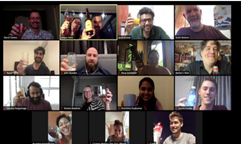PROXIMITY ONLINE
COURSE DEVELOPERS
On mobile, this website is best experienced in landscape mode

What we do
At Proximity Online Course Design we assist university and college lecturers to design and develop high quality online courses for remote and blended learning.
Our range includes modules at the following levels:
- certificate
- diploma
- undergraduate, and
- post-graduate (Honours and coursework-based Masters), as well as
- stand-alone continuous professional development (CPD) courses.
Our work is shaped by the firm belief that online learning, in either remote or blended form, can be just as effective, engaging, challenging and interactive as face-to-face learning. In fact, it is often more so. However, we are realistic about the place of digital technology – it should serve the purposes of teaching and learning, not determine their shape.
Why use our service?
Currently higher and tertiary education institutions worldwide are being forced to embrace online remote teaching in order to address the effects of the 2020/21 pandemic. Looking beyond the pandemic, institutions are increasingly adopting blended learning modalities in the longer term, merging the real advantages of online features with face-to-face teaching and learning.
However, multiple current pressures and challenges make it difficult for faculties and colleges to allocate time and human resources to producing quality learning materials or courses. These demands all too often result in the quality of online teaching and learning being poor. Simply lecturing online via video, Zoom or Teamview, hastily-reworked lecture notes and endless, text-heavy PowerPoint presentations used as online teaching tools tend to alienate students. They also threaten to relegate many higher education programme offerings to the league of transmission-mode correspondence courses.
At the same time, the inappropriate use of digital media such as ‘talking head’ videos actually disadvantages those students who have to pay for off-campus data use. Most of the data they are paying for are, after all, expended in making the lecturer visible, which seldom contributes much of pedagogic value (Rowe, 2020).

However, advances in online pedagogy and technology-enhanced learning make it possible to design or re-design courses thoughtfully and creatively for maximum student engagement, and for a positive impact on learning, throughput and student success. Significantly, such courses do not have to be data-hungry, or expensive for students to use.
 Digitised content, when combined with sound, well-established pedagogic principles, can infuse online education with excitement, challenge, active learning and interaction.
Digitised content, when combined with sound, well-established pedagogic principles, can infuse online education with excitement, challenge, active learning and interaction.Our services
1. Programme and course content writing and design
We can:
1.1 develop new fully online or blended courses from basic curriculum documents (i.e. ‘from scratch’)
1.2 adapt an existing face-to-face course, designing an exciting, interactive blended or fully online offering, or
1.3 collaborate with subject experts (as much or as little collaboration as the lecturer desires) to design courses in a variety of content domains.
Each of these options may entail:
- conducting the necessary desk-top research
- submitting draft course outlines to match specifications
- submitting a course ‘storyboard’ for comment
- searching for appropriate learning resources, as well as finding and possibly adapting quality open educational resources (OER)
- commissioning and overseeing artwork from trusted and talented illustrators and graphic artists
- designing learning activities and formative assessments – where appropriate using, or providing specifications for the use of, a range of digital teaching and learning tools
- submitting first-unit drafts for comment
- peer reviewing these and further drafts,
- recommending trusted production houses and technical freelancers, and
- re-working drafts in response to trialling or other feedback from the lecturer.
2. Online course production
Course options 1.1, 1.2 and 1.3 may be rendered as:
– text versions in MS Word or pdf, for conversion by a third-party service provider or providers to a SCORM or Moodle package, or
– interactive SCORM or Moodle packages, which, with the addition of required videos, audio or multi-media, will be suitable for uploading on to any of the learning management systems (LMSs) used in SA universities.
__________________
Background
Up till the mid-1980s, thinking about teacher knowledge tended to focus either on teachers’ content knowledge or on their pedagogic knowledge. In 1986 Shulman introduced the helpful idea of pedagogical content knowledge (PCK), which ‘exists at the intersection of content and pedagogy’, rather than viewing them in isolation. PCK represents ‘the blending of content and pedagogy into an understanding of how particular aspects of subject matter are organised, adapted, and represented’ in teaching, with an eye to rendering specific subject content teachable as well as accessible to learners.
Since the late 1980s successive waves of new digital technologies including hardware, software and the internet, have exerted an increasing influence on teaching and learning, and on pedagogical content knowledge. Some two decades after Shulman, Mishra and Koehler pointed out how these new technologies have the potential to change not only the nature of teaching and learning, but even the nature of the subject content itself, as well as the social context in which learning takes place.
One example which they provide illustrates how subject matter itself can be changed by the application of technology. A particular software programme designed for teaching geometry
"allows students to play with shapes and form, making it easier to construct standard geometry proofs. In this regard, the software program merely emulates what was done earlier when learning geometry. However, the computer program does more than that. By allowing students to ‘play’ with geometrical constructions, it also changes the nature of learning geometry itself; proofs by construction are a form of representation in mathematics that was not available prior to this technology. Similar arguments can be made for a range of other software products" (Mishra & Koehler, 2006: p.1028).
In online and blended learning, three types of knowledge converge: pedagogical, content and technological knowledge (PCTK, often referred to as TPACK). The new digital technologies require us to reconfigure our understanding, not just of technology, but of all three components (Mishra & Koehler, 2006: p.1030).
The design capabilities of the Proximity Online course writers and educational designers combine content knowledge (in Education-related subjects broadly), pedagogical knowledge, and technological knowledge (understanding the range and affordances of today’s online technologies), as well as the intersection of these three in course development.
We prefer to leave the more technical hands-on production (videos, audio, multi-media) to trusted experts in these fields. These experts may be in your institution’s media production unit, or they may be freelancers or in external production houses that we trust and will be happy to recommend.
__________________
Benefits
Constructing an academic course that is effective on all levels typically requires the services of at least a subject matter expert, a writer, an instructional designer, a graphic designer, a language editor, possibly an illustrator, a videographer, a voice-over presenter and audio technician, a multi-media developer and the educational technologist who combines what each of these specialists produce into a package that can be loaded on to an LMS, such as Blackboard, Sakai or Moodle. This is what contributes to the relatively high cost of online course production.
However, we have been able to assemble a multi-skilled team who are all first and foremost thoroughly grounded in educational theory and practice as well as being experienced writers and designers of highly-rated learning material. In addition, the power of today's software brings within our reach much of the combined functionality of the diverse specialists mentioned above, with the exclusion of video, audio and some multi-media production. We are thus able to keep development costs to a minimum.
Institutions which have their own technical production units, or well-established arrangements with external service providers, may choose to use only our course writing service up to the point of delivering a polished course in print form (MS Word and pdf), i.e. 1.1, 1.2 or 1.3 above.
Please request our Pricing Guide,
and/or share your needs with us at CONTACT US
Why "Proximity"?
The remote learning environment may be a lonely one, in which students largely forego the benefits of sharing the learning process as described by Vygotsky, and by Lave, Wenger and others. However, there are ways of overcoming the isolation often experienced in online learning, and of creating and maintaining a sense of proximity, challenge and excitement, partly through the medium of synchronous chat groups and asynchronous discussion forums.
We believe that proximity can be present in online classes.
It can be brought about through careful and purposeful pedagogical means: success in online courses is primarily dependent on the quality and success of the discussion in the course.
“In facilitating communication that models the proximity of a traditional classroom, instructors need to be engaged, relational, and personal. If done correctly, these interactions can lead to higher-level learning as students broaden their own knowledge while reflecting on the knowledge and experiences of their peers and instructor (Gonzalez, 2010)” – Dyer, T., Aroz, J. and Larson, E. (2018) Proximity in the online classroom: Engagement, relationships and personalisation. Journal of Instructional Research, 7: 108.
In developing courses and learning resources, we strive to close proximal gaps in remote learning - between students, between students and lecturer, and in addition, between the lecturer and the online course developer. This is based on the Community of Inquiry framework that incorporates lecturer, group, cognitive and learner presence. Aside from our range of subject expertise in the field of Education, this is probably where our greatest strength lies.
 |  |
Who we are
Proximity Course Development is a new start-up enterprise drawing on the proven talents and expertise of a small team of highly experienced writers and designers. All of us have worked on contract to universities, colleges and NGOs over the past two decades, developing a wide range of courses up to post-graduate level since the 1990s. We have also kept abreast of new developments in educational technology and online course design approaches. We understand:
– the different level descriptors associated with the various academic levels on the National Qualifications Framework (NQF), including the Higher Education Qualifications Sub-Framework (HEQSF)
– the critical importance of teaching/learning texts being accessible (epistemological access) and engaging, especially where the subject matter is necessarily complex or involves fine distinctions
– that there are academically legitimate ways (always keeping higher order cognitive engagement in view) to ensure that students do not have to struggle to learn a discourse that is new to them, especially if they are studying remotely. And that some, but not all, of these means depend on the skilful and appropriate use of digital learning technologies
– the centrality of pedagogic content knowledge – employing the active learning approaches and technologies appropriate to each subject or content domain that will challenge students and help them to achieve understanding, insight, and the ability to apply, evaluate and transfer knowledge.
Our course developers
Mike Adendorff (Director)
Lecturer: 28 years’ experience – contact, distance and online teaching: Curriculum theory; pedagogy; assessment; sociology of education; classroom management; teaching as a profession; reflective practice; English 1st & 2nd language (Colleges of Education, UWC, UFH, SAIDE) Course writer & trainer in materials development: 25 years devoted to making complex concepts accessible, from diploma to Masters – Curriculum, teaching & learning; using media in teaching; being a teacher; introduction to OBE & developing effective learning materials; educational management information systems for development; assessment in primary school; reflective practice; from curriculum to lesson plan; being a TVET lecturer, (UWC, UFH, SAIDE, freelance) Researcher: Faculty Research Co-ordinator, post-graduate research supervision Authored articles and chapters in 3 books (UFH, DHET, freelance) Project Manager in major open learning projects: (SAIDE, DHET)
Dr Liz Botha
Educator: English 1st & 2nd language in schools; Lecturer: Teaching English as Additional Language; Education & Professional Studies (Universities of Fort Hare & Bophuthatswana) Online: Teaching Reading for Meaning (Rhodes University) Materials developer: Distance education; teacher education (in-service & pre-service); language skills, literacy, academic literacy, additional language learning & teaching; core Education studies (Foundation & Intermediate Phases); study skills (WITS, Rhodes University, UFH; SAIDE: Teacher Education in Sub-Saharan Africa Project (TESSA) Research: Currently Research Associate, Rhodes University PhD on language acquisition & identity (English and African languages) One book authored, several book chapters, numerous articles in refereed journals, mainly on language, literacy acquisition & identity Consultant: FET College Improvement Project (Joint Education Trust) Development of publications & learning materials (Rhodes U.) Founder & Project Manager: TALK Project, learning African languages Director: Distance Education Project; School of In-Service Programmes (University of Fort Hare)
Prof Philip Uys
Educational Technologist: 25 years’ experience introducing new learning technologies, digital & remote learning in higher education: Australia, New Zealand, South Africa, Botswana, Liberia, Kenya, Samoa, Tonga, Malaysia, Bangladesh & Papua New Guinea Course writer: Educational technology; Digital Learning; Adult Education Educator: Senior lecturer, Education leadership & technology (Massey University, NZ); Change management & educational technology (Charles Sturt University, Australia.) Researcher: PhD in Education & Communication. Educational technology, digital learning & learning analytics; Co-authored 2 books; authored 5 book chapters; numerous articles in refereed journals & conference proceedings; key note lectures; Adjunct Associate Professor of Education, University of Adelaide, Australia International consultant: 20 years’ experience in 11 countries: Curriculum & course design; educational quality; assessment; educational technology
Neil Avery
Educator: 21 years as lecturer in contact, distance, and online learning (Natal College of Education, Universities of Fort Hare & KwaZulu Natal) 17 years as school teacher & principal Course writer & materials developer: Mainly in education leadership & management (Norwegian University of Science & Technology, California State University, SAIDE) Senior Education Consultant & Project Manager: Developing teaching/learning materials, facilitation/coaching skills Consulting (SAIDE, SARS, Toyota Teach, Provincial Departments of Education) Researcher: Post-graduate research supervision Authored 3 book chapters
Bobbie Louton
Course developer: School/classroom management; classroom practice; social justice; sociology of education; curriculum, pedagogy & assessment; reflective practice (freelance: SANTS, SAIDE/DHET) Researcher: Online teaching, learning in TVET; children’s rights in SA schools (freelance: SABEN, PID Water Research Commission) Academic writer & editor: (UKZN, DUT, WITS, UFS; international clients DST-NRF Centre for Indigenous Knowledge Systems) Educator: Contractual teaching/lecturing in basic & higher education, community programmes (Palestine, USA, SA)
Our core values
Quality
The kind of quality we are after is the kind that produces engaged and successful students. The use of digital educational technology must always be in the service of sound pedagogical design, not the other way round.
Courses must be learning-centred
Learning materials and resources must engage the student and challenge the student. Learning, especially in higher education, is not memorising, nor is it even just understanding. It must involve using and applying knowledge and conceptual understanding – to create, evaluate, make choices and think critically.
Online learning should be at least as effective as good face-to-face teaching
We believe that in many ways well-designed online courses, whether offered at a distance or in blended form, can and should provide a more effective learning experience than traditional contact education – though of course it does not do so necessarily simply because it's digitised. Most shortcomings of remote learning can be compensated for, and many of its benefits are in fact not encountered in contact courses.
Collaboration
As a collective of seasoned educators and materials developers, we know that collaboration, with one another and with our clients, is vital to both our service and the courses we produce. At the heart of collaboration is the art of listening.
Social justice
Looked at holistically, no education is ever culturally, politically or economically neutral. Throughout our careers, our work has always reflected values consonant with people-based empowerment, democracy, decolonisation and social justice.
Integrity
Professional integrity is at the root of our work. Dependable service and production, ethical dealings, earned respect and trust are its fruits.
Copyright
- Copyright of all courses will vest in the client (in most cases this is the institution).
- Any open educational resources (OER) incorporated in the courses will be attributed to their original authors. No licensing or permission will be required to re-use these. OER bearing a Creative Commons ND licence (non-derivative) can unfortunately not be remixed or adapted; if there is no ND element in the licence, adaptation is permitted.
- We will also attempt to negotiate and secure the necessary permission for the re-use of any copyright-reserved resources required that exceed the normal limits on fair use.
- If a client requests the incorporation of such copyright-reserved material that incurs any once-off licence fees or recurring payments, we will notify the client, who will be liable to make such payments to the copyright holders. However, we will also do our best to find alternatives – either providing links to the material or alternative sources.
ACKNOWLEDGEMENTS
- Home page image by Gerd Altmann (Pixabay)
- Photograph of female student talking online (Why use our service?): Tima Miroshnichenko (Pexels)
- Photograph of course designer collaborating with lecturer (Why "Proximity"?): Sarah Pflug (Burst)
- All other photographs courtesy of Site 123
- Thanks to Site123 for making the construction of this website such a good experience.
Contact us
- +27-722144297 - Proximity Online Course Design
- info@proximityonline.co.za
- Mon-Fri - 09:00-19:00
Mike Adendorff, Director Hogsback, South Africa